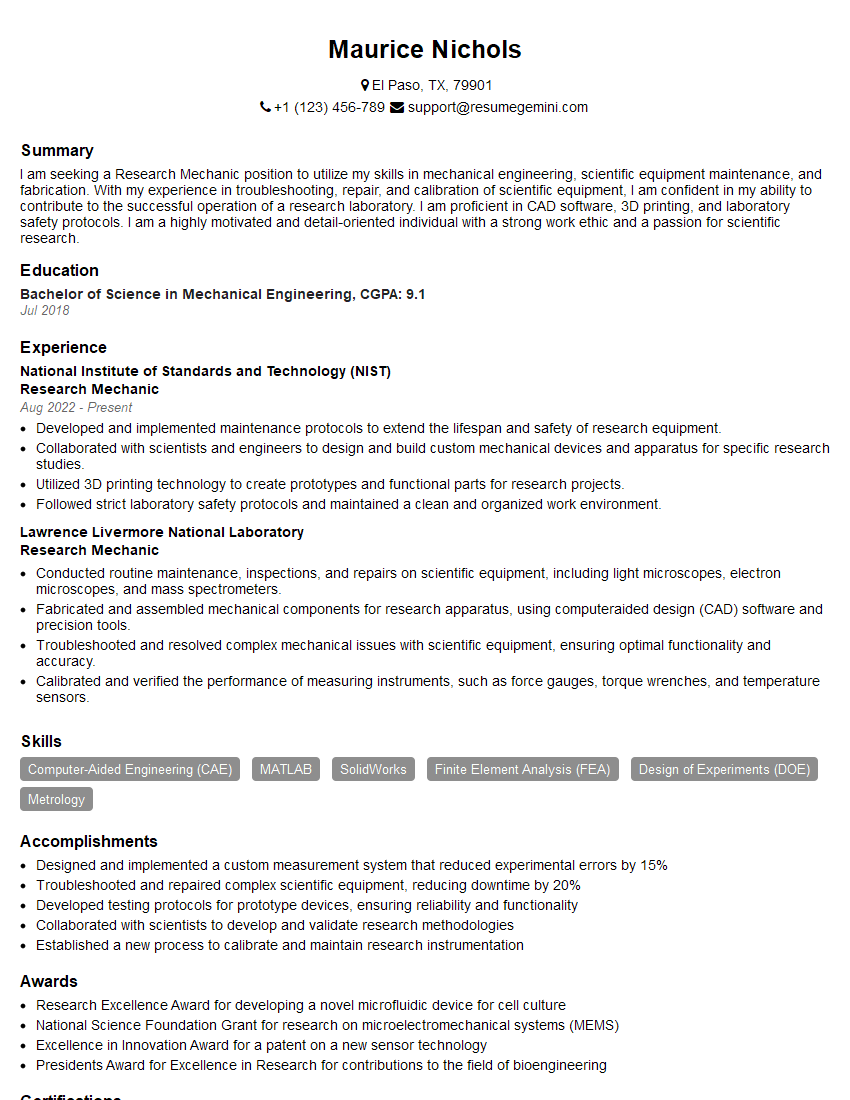Are you a seasoned Research Mechanic seeking a new career path? Discover our professionally built Research Mechanic Resume Template. This time-saving tool provides a solid foundation for your job search. Simply click “Edit Resume” to customize it with your unique experiences and achievements. Customize fonts and colors to match your personal style and increase your chances of landing your dream job. Explore more Resume Templates for additional options.

Maurice Nichols
Research Mechanic
Summary
I am seeking a Research Mechanic position to utilize my skills in mechanical engineering, scientific equipment maintenance, and fabrication. With my experience in troubleshooting, repair, and calibration of scientific equipment, I am confident in my ability to contribute to the successful operation of a research laboratory. I am proficient in CAD software, 3D printing, and laboratory safety protocols. I am a highly motivated and detail-oriented individual with a strong work ethic and a passion for scientific research.
Education
Bachelor of Science in Mechanical Engineering
July 2018
Skills
- Computer-Aided Engineering (CAE)
- MATLAB
- SolidWorks
- Finite Element Analysis (FEA)
- Design of Experiments (DOE)
- Metrology
Work Experience
Research Mechanic
- Developed and implemented maintenance protocols to extend the lifespan and safety of research equipment.
- Collaborated with scientists and engineers to design and build custom mechanical devices and apparatus for specific research studies.
- Utilized 3D printing technology to create prototypes and functional parts for research projects.
- Followed strict laboratory safety protocols and maintained a clean and organized work environment.
Research Mechanic
- Conducted routine maintenance, inspections, and repairs on scientific equipment, including light microscopes, electron microscopes, and mass spectrometers.
- Fabricated and assembled mechanical components for research apparatus, using computeraided design (CAD) software and precision tools.
- Troubleshooted and resolved complex mechanical issues with scientific equipment, ensuring optimal functionality and accuracy.
- Calibrated and verified the performance of measuring instruments, such as force gauges, torque wrenches, and temperature sensors.
Accomplishments
- Designed and implemented a custom measurement system that reduced experimental errors by 15%
- Troubleshooted and repaired complex scientific equipment, reducing downtime by 20%
- Developed testing protocols for prototype devices, ensuring reliability and functionality
- Collaborated with scientists to develop and validate research methodologies
- Established a new process to calibrate and maintain research instrumentation
Awards
- Research Excellence Award for developing a novel microfluidic device for cell culture
- National Science Foundation Grant for research on microelectromechanical systems (MEMS)
- Excellence in Innovation Award for a patent on a new sensor technology
- Presidents Award for Excellence in Research for contributions to the field of bioengineering
Certificates
- Certified SolidWorks Professional (CSWP)
- Finite Element Analysis Certification (FEAT)
- Design of Experiments Certification (DOE)
- Metrology Certification
Career Expert Tips:
- Select the ideal resume template to showcase your professional experience effectively.
- Master the art of resume writing to highlight your unique qualifications and achievements.
- Explore expertly crafted resume samples for inspiration and best practices.
- Build your best resume for free this new year with ResumeGemini. Enjoy exclusive discounts on ATS optimized resume templates.
How To Write Resume For Research Mechanic
- Highlight your technical skills and experience in scientific equipment maintenance and repair.
- Showcase your ability to troubleshoot and resolve complex mechanical issues.
- Emphasize your proficiency in CAD software and 3D printing.
- Demonstrate your understanding of laboratory safety protocols and your commitment to maintaining a safe work environment.
Essential Experience Highlights for a Strong Research Mechanic Resume
- Conduct routine maintenance, inspections, and repairs on scientific equipment, including light microscopes, electron microscopes, and mass spectrometers.
- Fabricate and assemble mechanical components for research apparatus, using computer-aided design (CAD) software and precision tools.
- Troubleshoot and resolve complex mechanical issues with scientific equipment, ensuring optimal functionality and accuracy.
- Calibrate and verify the performance of measuring instruments, such as force gauges, torque wrenches, and temperature sensors.
- Develop and implement maintenance protocols to extend the lifespan and safety of research equipment.
- Collaborate with scientists and engineers to design and build custom mechanical devices and apparatus for specific research studies.
- Follow strict laboratory safety protocols and maintain a clean and organized work environment.
Frequently Asked Questions (FAQ’s) For Research Mechanic
What is the role of a Research Mechanic?
Research Mechanics are responsible for maintaining, repairing, and fabricating scientific equipment used in research laboratories. They troubleshoot complex mechanical issues, calibrate and verify the performance of measuring instruments, and develop maintenance protocols to ensure the equipment operates at optimal functionality and accuracy.
What are the qualifications required for a Research Mechanic?
Research Mechanics typically have a Bachelor’s degree in Mechanical Engineering or a related field. They should have a strong understanding of scientific equipment, CAD software, and laboratory safety protocols. Experience in troubleshooting, repair, and fabrication is highly desirable.
What are the key skills of a Research Mechanic?
Key skills for a Research Mechanic include: mechanical engineering principles, scientific equipment maintenance, CAD software proficiency, troubleshooting and repair, calibration and verification, and laboratory safety protocols.
What are the career prospects for a Research Mechanic?
Research Mechanics can advance to positions such as Research Engineer, Laboratory Manager, or Technical Specialist. They may also pursue further education in mechanical engineering or a related field to enhance their career prospects.
How can I prepare for a career as a Research Mechanic?
To prepare for a career as a Research Mechanic, you can pursue a Bachelor’s degree in Mechanical Engineering or a related field. Gain hands-on experience through internships or research projects involving scientific equipment. Develop proficiency in CAD software and laboratory safety protocols. Additionally, attending industry conferences and workshops can help you stay up-to-date on the latest advancements in scientific equipment and maintenance.
What is the work environment of a Research Mechanic?
Research Mechanics typically work in research laboratories, universities, or industrial settings. The work environment can involve working with hazardous materials, heavy equipment, and precision instruments. Adherence to laboratory safety protocols is essential to ensure a safe work environment.